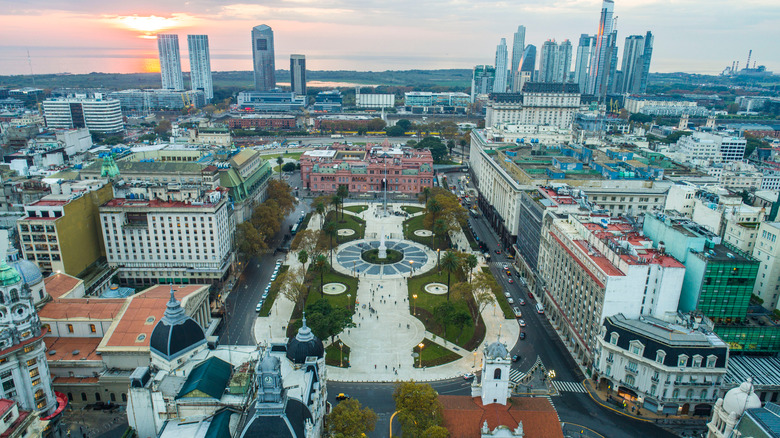Buenos Aires, Argentina
Buenos Aires is often considered the Paris of South America, its streets shimmering with vibrant art, delicious restaurants, and fascinating cultural sites. It’s also a city of diverse activities, including catching a tango show, sailing up the delta, or wine tasting. And if cafe hopping is your jam, you’ll want to head to the trendy Palermo district to watch a mix of locals and foreigners mingling over coffee.
Locals, referred to as porteños, are a laid-back bunch. They’re curious and open and love a good philosophical discussion. They’re not shy to strike up a conversation and ask where you’re from — and if you hit it off, they may even invite you for merienda, a late afternoon meal typically consisting of coffee or tea and a pastry.
Unfortunately, the economic crisis has taken its toll, and opportunistic theft isn’t uncommon. Secure, cross-bodied bags are the norm, and fanny packs are all the rage here. Due to phone snatching, using your cell phone on the street is discouraged, especially in touristy areas like La Boca and San Telmo. Truthfully, the best way to enjoy the city is to put that phone away, be fully present, and absorb all those porteño vibes.
Cartagena, Colombia
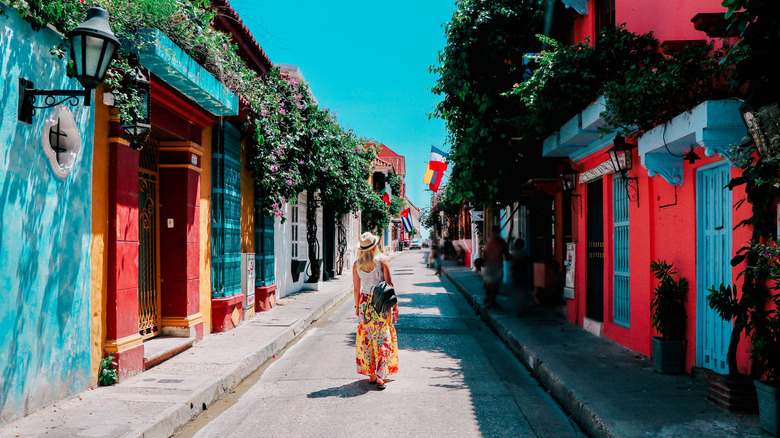
Are you excited to travel but dread long-haul flights? If that sounds like you, consider charming Cartagena. This seaside city is one of the closest South American destinations to the United States. As such, if you plan to visit multiple places, Cartagena is a logical entry point to South America.
Cartagena is located on the Caribbean coast and bursting with old-world charm, from its cobblestone streets to colorful colonial-era buildings. It’s got a bit of everything that tourists crave: architecture, beaches, great food, and vibrant nightlife. However, it’s not a place with one or two world-famous sites you must tick off your list. Visiting Cartagena is about experiencing the city and fully embracing that traveling spirit. If you’re the type of tourist who hates strict itineraries and following other people’s schedules, this is the city for you.
To stay safe when exploring alone, we’d stick to the typical tourist zones and be weary of dating scams. There’s plenty of fun within the mostly walkable walled city, including countless bars, restaurants, shopping, and murals. If you want to venture further out, join a tour or other travelers. There’s incredible snorkeling at Islas de Rosario, and you can visit Totumo Mud Volcano to take a natural mud bath. If you’re concerned about partying solo at night, there are also tours that will take you bar hopping and dancing with a group of fun-loving foreigners.
Cusco, Peru
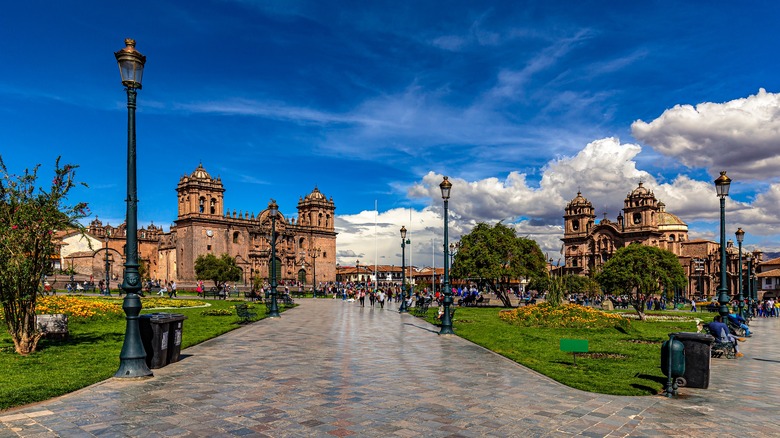
WitR/Shutterstock
Cusco is the gateway to Machu Picchu, which is a frequent presence on many globetrotter’s bucket lists. But this city offers so much more than this one destination. It’s the perfect base for many incredible hikes in Peru, like the Rainbow Mountains or Salkantay. Day trips could help you see many other Incan ruins and archeological sites like the Sacred Valley. And with a plethora of tours, you won’t have to worry about being alone while trekking through the area.
There’s also plenty to explore within the city limits. Cusco is a beautiful, mid-sized city with a rich history, and it’s actually a UNESCO World Heritage Site. The hilly, cobblestone streets are lined with Spanish Colonial-era structures built atop Incan ruins. Since tourism abounds here, you’ll be met with unique souvenir shops, tasty restaurants, bars, and entertainment. Plus, it’s all very walkable, so you never feel overwhelmed as a solo traveler. And with a strong hostel culture, it’s also super easy to make new friends. Ultimately, you never have to feel alone here, unless you want to, of course!
La Paz, Bolivia
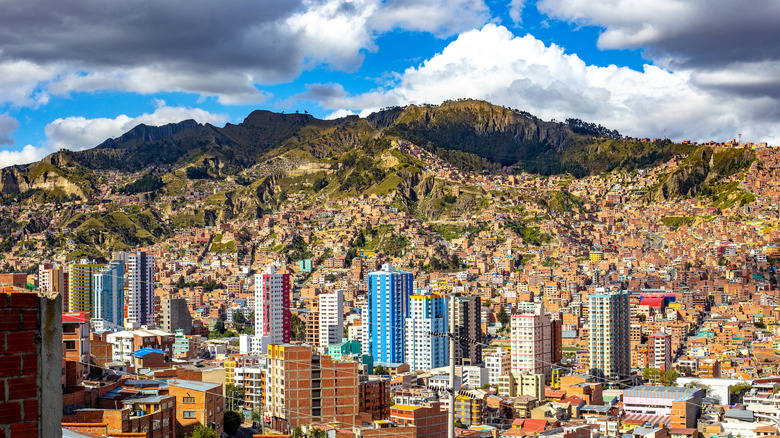
Juan Cristhian Valenzuela/Getty Images
La Paz is the perfect blend of calm and chaotic. It’s a city of extremes, and as the world’s highest capital city, it’s also a place of superlatives. Here, you can ride bikes down the world’s most dangerous road, dubbed the Death Road, for obvious reasons. For some of the most impressive views of the area, hop on cable cars to the nearby El Alto, Bolivia’s youngest and highest city (per Geographical). And if you’re craving a more relaxed experience, sit back in the square and enjoy a coca leaf tea, which can also offset that pesky altitude sickness.
The beauty of traveling here alone is you can create your ideal itinerary. Let’s face it; not everyone has the same taste in activities. But with so many once-in-a-lifetime experiences, you’ll want the freedom to explore La Paz in your own way. If you’re an adrenaline junkie, you don’t want your risk-averse friends holding you back. And if you’re fascinated with astrology, alternative medicine, or spirituality, you’ll want to take your time wandering the Witches’ Market.
While traveling in Bolivia is an adventure, it isn’t always the most comfortable. Even in major cities like La Paz, you might want to carry a pack of tissues, be weary of fake police officers or unofficial taxi drivers, and drink bottled water. Adjusting to the high altitude may take a few days, so bring some meds and plan accordingly.
Lima, Peru
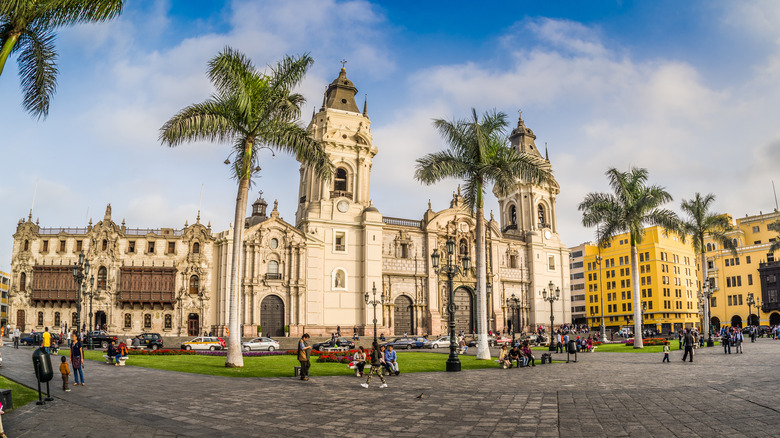
Christian Vinces/Shutterstock
As the gastronomic capital of South America, Lima is a foodie’s paradise. Unsurprisingly, this city contains four of the World’s 50 Best Restaurants and constantly exports world-class chefs. With a long coastline and fertile land, Peru has access to flavorful ingredients and churns out incredibly delicious cuisine, from super fresh ceviche and causa (mashed potato and shredded chicken casserole) to spicy rocoto relleno (stuffed peppers). When traveling alone, you can spend all the time in the world savoring this delectable cuisine. Or better yet, join one of the many food tours to sample a wide variety of dishes or take a stab at cooking them yourself.
If you’re nervous about getting a table for one — don’t be. Many travelers dine solo, and you may even make a new friend or two. However, you should still exercise some caution and don’t leave your food or drinks unattended. If traveling alone, you can always check the U.S. government’s travel advisory for Peru. While the website doesn’t recommend visiting certain regions, Lima is typically excluded from that list. It’s still recommended to avoid protests and demonstrations. Don’t wear flashy jewelry or carry excessive amounts of cash, and stick to well-lit areas after dark.
Medellín, Colombia
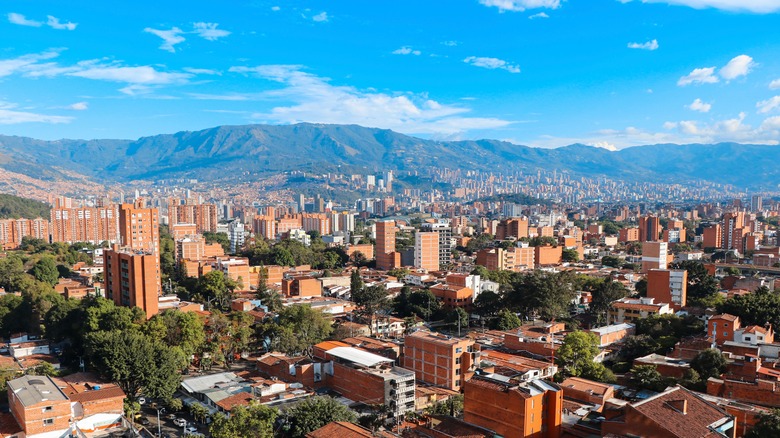
Yuki Shu/Shutterstock
Medellín is known as Colombia’s “Capital of Cool” for good reason. This city has distinct neighborhoods, each offering a completely different vibe, but according to a Time Out survey, Medellín’s Laureles barrio is considered “the world’s coolest neighborhood.” It’ll please even the trendiest of hipsters, with everything from green spaces and cafes to yoga studios and a nightlife that doesn’t quit. Medellín is also nicknamed ‘The City of Eternal Spring’ thanks to its year-round pleasant climate. Medellín is located in a lush green valley surrounded by mountains, with parks everywhere and quaint villages just a stone’s throw away, providing a breath of fresh air and a window into the country’s more traditional side.
To top it all off, Medellín is also the digital nomad hub of South America. If traveling solo and planning to do some remote work, you should have no issues finding suitable coworking spaces and solid Wi-Fi connections. The country has even established a digital nomad visa, enabling remote workers to stay up to 180 days within a calendar year. Mingling with nomads won’t give you the most authentic local experience, but this crowd is usually very open to meeting others and trying new things on a whim. So, if you’re looking for an instant social circle, Medellín delivers.
Montevideo, Uruguay
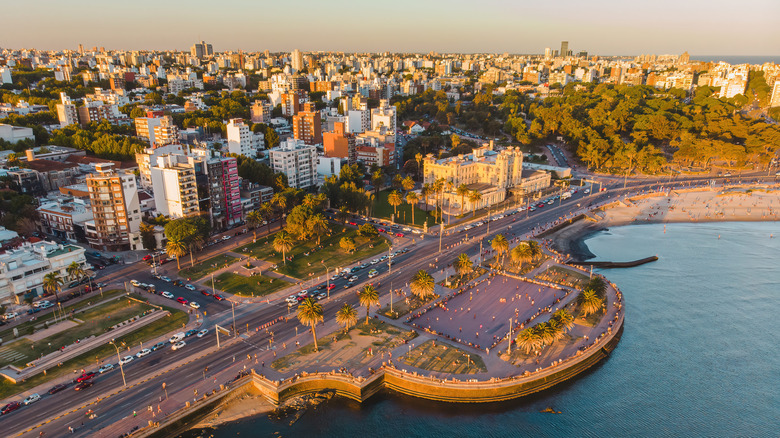
Drone 5/Shutterstock
Uruguay often ranks as the safest country in South America (per World Population Review). This is excellent news if you’re a solo traveler concerned with safety. However, you can be forgiven for not knowing this fun fact because, when it comes to international destinations, Uruguay flies under the radar. As such, its capital city, Montevideo, doesn’t get the love it deserves. This works in its favor because here, you won’t feel overwhelmed with swarms of tourists. Instead, Montevideo has a laid-back vibe. It’s easy to navigate, even without speaking Spanish or the help of fellow travelers, and you’ll quickly feel at ease as you enjoy elegant architecture, waterfront walks, and lots of live music and entertainment.
Montevideo’s best-kept secret is its food. Just a half-hour outside the city, you’ll find sprawling, free-range ranches and gorgeous vineyards. This means exactly what you’d expect: sumptuous steaks and delicious wines. With a long coastline, the city also has excellent seafood restaurants, including Es Mercat, which is touted as the city’s best fish restaurant. When ordering, ask for the chef’s recommendation, and it won’t disappoint.
Punta del Este, Uruguay
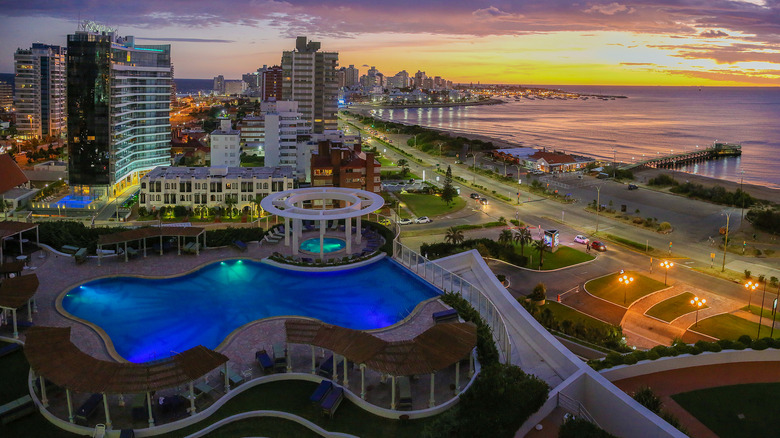
Luckyviks/Getty Images
Punta del Este is sometimes called the “Monaco of South America,” thanks primarily to its high-rise buildings, sophisticated restaurants, and many casinos. People come here to invest in luxury real estate and party until the wee hours, but this city isn’t just about the glitz and the glam. This seaside destination has some of South America’s most beautiful beaches and an energetic surfing community. One of the top beaches is Playa Brava, where you’ll find a larger-than-life sculpture of a hand emerging from the sand. Whether you crave sunshine or are a night owl, you’ve got options.
Even better, Punte del Este has a safe feel in the city overall. People of all ages stroll throughout town at all times of day, so you never feel too out of place, even alone. With its increasing tourism, even if you don’t speak Spanish, you will likely stumble across some English-speaking communities to keep you company. Plus, the city is only a two-hour bus ride from Montevideo. All these elements combined make Punta del Este a top city for solo travelers of all kinds.
Rio de Janeiro, Brazil
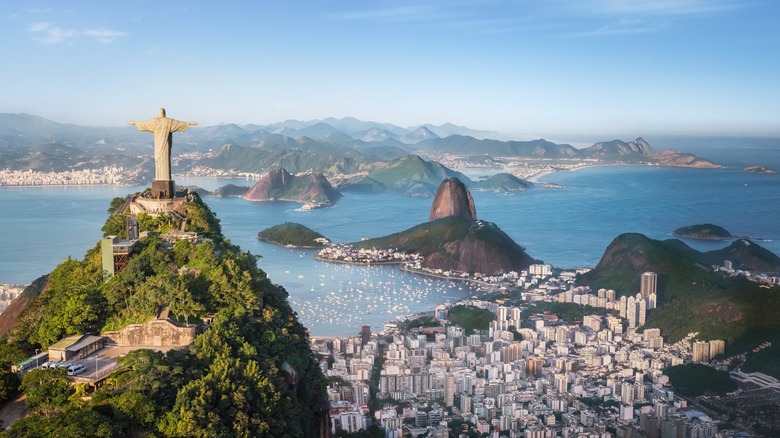
Diego Grandi/Shutterstock
Rio de Janeiro has a magic that’s hard to find elsewhere. Locals, referred to as Cariocas, love to have a good time. And with warm weather year-round, the fun often happens outdoors. Take a hike or ride a gondola to Rio’s mountain peaks for postcard-worthy views. If you prefer sea level, the city has a vibrant beach culture. People flock to famous hot spots like Ipanema and Copacabana to swim, play soccer, or socialize with friends. It’s the ideal place for people-watching — and solo travelers will have no problem entertaining themselves for hours.
Street culture is strong in Rio. Everywhere you turn, you’ll find art, music, and dancing. It’s not uncommon to stumble upon an impromptu street performance, and locals are more than happy if you join in. Cariocas are warm and hospitable, and the good vibes are contagious. It’s hard to feel alone when everyone around you is so welcoming.
However, Rio isn’t the safest travel destination in the world, but with some common sense and street smarts, you’ll significantly reduce any risks. A big issue many tourists encounter is theft and pickpocketing. Don’t walk around showing off valuables or expensive jewelry, and keep your wallet in a secure location. Your towel and water bottle might be fine in that open tote, but we’d keep any money and phones in a zipped bag, particularly when walking through crowds. Be cautious about walking at night, and stick to official taxis or ride services.
Salvador, Brazil
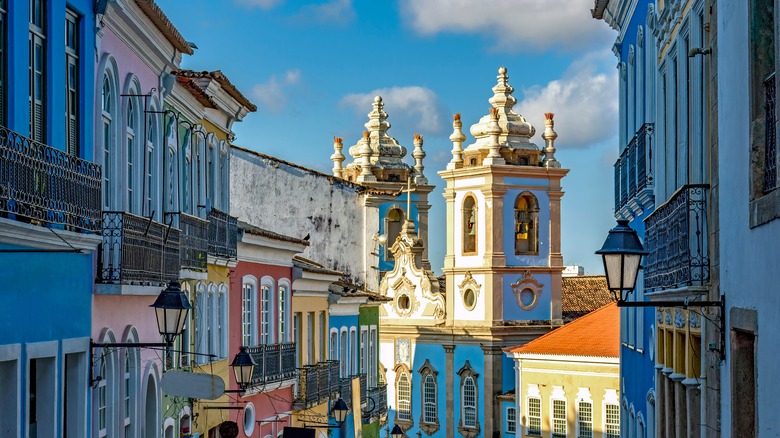
Fred S. Pinheiro/Shutterstock
Salvador de Bahia is the sort of place that tantalizes all your senses — and when traveling solo, it’s impossible to get bored here. The architecture alone is captivating and will inspire the budding photographer in you as the city is delightfully photogenic, with quaint cobblestone streets and pastel-hued buildings. It’s even rumored to have over 365 churches, one for each day of the year.
Even if you get tired of visiting churches and snapping photos, you can stroll down the Farol da Barra beach or check out the views from the top of the Lacerda Elevator. And when hunger strikes, make time for some local cuisine. Salvador has a rich culinary heritage, and seafood fans will be delighted by the moqueca Baiana (seafood and coconut milk stew) or bobó de camarão (pureed cassava and shrimp).
Salvador is also teeming with rhythm. It’s the center of Afro-Brazilian culture, and you’ll see this shine throughout the city. It makes sense that this region is the birthplace of Samba de Roda, a historic art form including music, dance, and poetry, often performed at special events or at random moments on the streets. Salvadorians are inclusive people and embrace foreigners, and with the locals’ disarming nature, even the shyest of solo travelers may find themselves cracking out of their shells and dancing in the streets.
San Carlos de Bariloche, Argentina
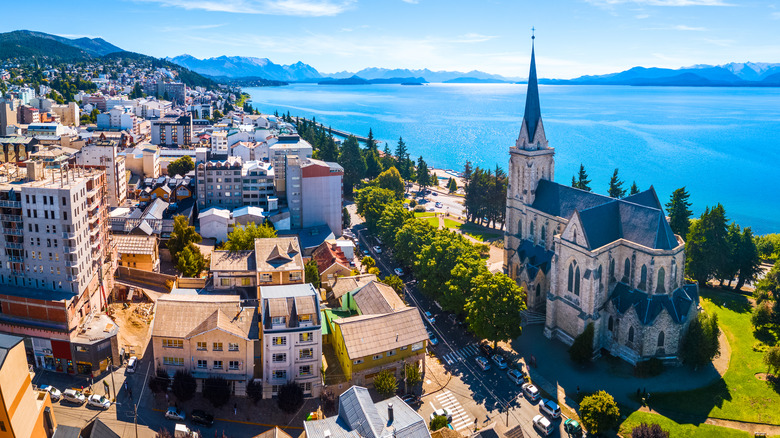
Dudarev Mikhail/Shutterstock
What better way to recharge those batteries than a solo trip to the mountains? San Carlos de Bariloche, typically shortened to Bariloche, is a Patagonian treasure at the foot of the Andes and boasts incredible hiking, skiing, and stunning views. It is the perfect choice for travelers who crave fresh air but also want to enjoy fine dining and comfortable accommodations. After all, it isn’t called the “Switzerland of the Andes” for nothing. So, if you want to enjoy outdoor activities without sacrificing creature comforts, you can enjoy the best of both worlds here. Some might say you can have your cake and eat it too — and since Bariloche has some of the best chocolate in South America, that cake is bound to be delicious.
Safety is often a top priority for solo travelers, and Bariloche is a well-to-do resort area with a relatively low crime rate and strong police presence. And although the city’s population is over 100,000 (per City Population), it still has that small-town feel. You can easily navigate Bariloche on foot, and hitchhiking to trailheads isn’t uncommon. Life moves at a slower pace in San Carlos de Bariloche, and as a popular tourist destination, it’s easy to meet fellow travelers.
Santiago, Chile
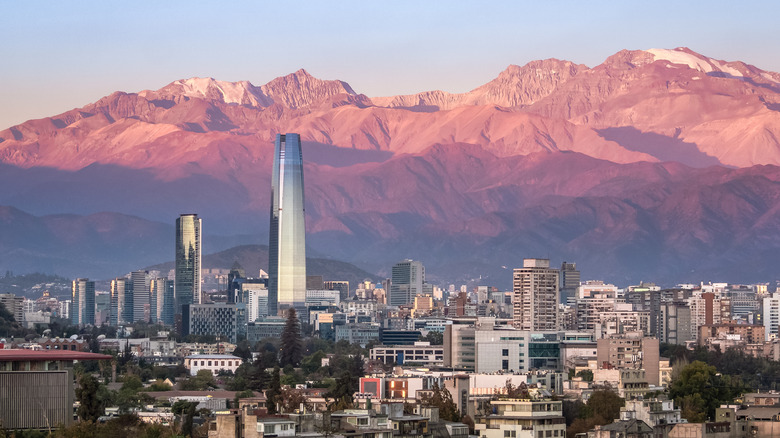
Diego Grandi/Shutterstock
Santiago is the capital of Chile and a great jumping-off point to explore the rest of the country. Here, you’re only an hour from both the mountains and the beach. Whether you want to ski or surf, you’ve got options, depending on the time of year. But if you want to stick around town, there’s plenty to explore within the city itself. On a clear day, take the gondola to Cerro San Cristóbal to see the Virgin Mary statue and catch a glimpse of the city from above. Visit the Santiago Metropolitan Cathedral in the Plaza de Armas or pick up a souvenir at the craft market near El Pueblito de los Dominicos.
The location sounds great, but you might be wondering what makes Santiago a solid choice for solo tourism. Well, it’s a combination of local hospitality and safety, particularly for solo female travelers. On a r/travel subreddit, one user was asked about safety and replied, “Yes, overall, Santiago and Chile are safe, at least in the areas you would visit as a tourist. There are solo women out and about everywhere.” Another chimed in, “I would have felt very safe as a solo female traveler the places I went … I was always totally comfortable and never experienced any unwanted attention.”

